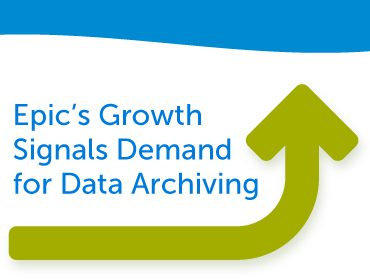
There is much that could be said about Epic as an electronic health record (EHR). Definitive Healthcare states: Hospitals and health systems are adopting the comprehensive EHR system to improve patient experiences, enhance care coordination, and significantly streamline services.
Fast facts about Epic:
- Epic is the leading EHR in inpatient and ambulatory segments with 36% of the EHR market share in the U.S. The closest competitors are Cerner and MEDITECH with 25 percent and 15 percent respectively.
- EHR replacements to Epic as the go-forward system in hospitals average about 35 per year (for 2021 and 2022).
As the Epic software hold continues to grow, so too does the need for data archiving.
A move to Epic necessitates a plan for the applications it will replace. Generally, the larger the organization, the larger the inventory of applications that will need to be addressed. Here are three considerations around legacy data:
- Not all legacy data (patient, business, and employee records) from a system Epic replaces gets converted to Epic due to cost and complexity, but it likely still needs to be retained for compliance with record retention regulations, Cures Act and legal needs in the future.
- Access to a complete historical medical record – including legacy patient data – can be imperative to a physician’s ability to deliver an accurate diagnosis and treatment.
- Archiving legacy data and making it available via Single Sign-On from Epic consolidates data stores, reduces out-of-production system maintenance costs, mitigates technical risk, complies with record retention mandates, and helps enable interoperability and data analytics.
For those three reasons (and many others), many providers determine that it makes sense to migrate only one to two years-worth of clinical data into Epic. The remaining data, which likely will be needed to meet record retention requirements for years to come, can be extracted and loaded into an active archive with secure Single Sign-On capabilities from Epic to ensure ongoing access and the ability for the legacy systems to be decommissioned, thus reducing hard and soft costs from the bottom line.
Examples of how healthcare organizations have addressed legacy data after a move to Epic:
Webinar: NewYork-Presbyterian’s Journey to Data Harmony
As one of the nation’s most comprehensive, integrated academic health care delivery systems, NewYork-Presbyterian had an expansive legacy data portfolio from its growth through mergers and acquisitions. With a strategic move to Epic as its single, go-forward EHR, legacy EMRs were displaced. The organization adopted a multi-year legacy data management program to archive its legacy clinical, financial and business data applications stored in over ten data centers. Access to the active archive is made available to clinicians through Single Sign-On from Epic. The initiative supported the organization’s mission of achieving “One Patient, One Record,” and allowed for the realization of significant cost savings.
Case Study: One Health System’s Data Archiving Strategy for Migrating to Epic
AltaMed, a 35-location health system in Southern California, moved from its NextGen electronic health record to Epic, which left patient records in multiple systems. Migrating all of the data to Epic was not feasible or affordable, so they turned to archiving as a solution. The first archiving vendor AltaMed chose could not complete the task at hand, as Emmet Jacobs, Director of Enterprise Applications at AltaMed, explains: “Unfortunately, the project did not go smoothly. During implementation, we found many errors in the archived data.” As it became clear that the originally-selected vendor could not handle the complexity of successfully archiving unique odontogram dental records, Harmony Healthcare IT was called in to turn the project around and complete the job within an aggressive timeframe.
Are you an Epic user looking for a trusted solution to help manage historical patient, employee, and business records? Or, is your organization considering a move to Epic in the future and in need of a partner for data migration and/or archiving?







